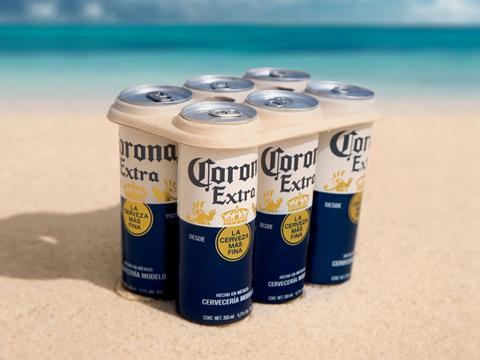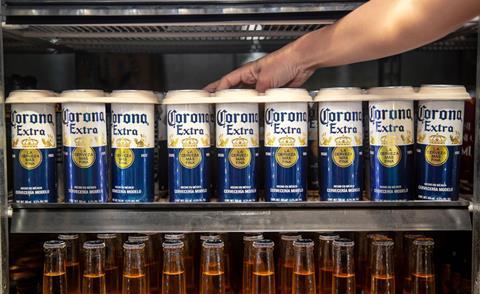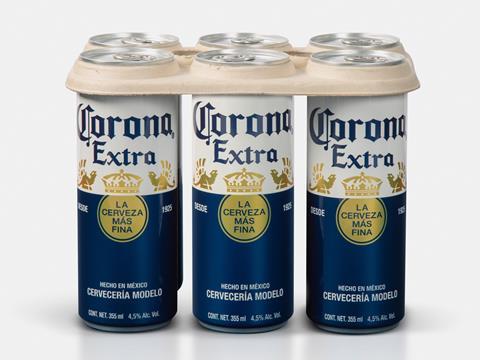
Another major beer brand has innovated to replace plastic aggregation rings in its packaging portfolio. Earlier this year Carlsberg announced its novel use of adhesives to glue cans together with the new Snap Pack. Now the Mexican brand Corona has unveiled its alternative approach: becoming the first global beer brand to use an aggregator made from plant-based biodegradable fibres, with a mix of by-product waste and compostable materials. If left in the environment, the new rings will break down into organic material, thus eliminating the risk associated with unrecycled polyethylene six-pack rings of lingering in the natural environment and photodegrading into microplastics. The bio-based rings will be piloted initially in Mexico in the new year.
The initiative is Corona’s substantive contribution to the brand’s commitment with Parley for the Oceans to lead the industry with eco-friendly packaging. The partnership between Corona (a brand owned by Anheuser-Busch InBev) and Parley began with a commitment to protect 100 islands by 2020 and expands to include the pursuit of scalable innovation that can change the status quo. Recognising the need to confront plastic pollution on multiple fronts, as roughly 8 MM metric tons of plastic entering the ocean each year, Corona has adopted Parley’s A.I.R. strategy to not only ‘avoid’ and ‘intercept’ plastic as much as possible, but also help ‘redesign’ solutions that use the material.

“We work with the best minds in the industry, both internal and external to create the technology platforms of the future,” Keenan Thompson, global director of innovation packaging at Anheuser-Busch, told Packaging Europe. “The brief for this project is simple: perform the job at hand but don’t use plastic. Beer is one of the more complicated products to create packaging for in the beverage industry – our bottles and cans need to sustain high pressures of pasteurisation and extreme weather temperatures whilst keeping oxygen out of the container. Secondary Packaging needs to be robust so that it can handle the rigours of distribution, retailer shelving and consumer transport and storage – these environments are often hot, cold, wet, dry, humid, and full of condensation. Any replacement for plastic rings has to be able to handle all of this whilst still being desirable to the consumer and relevant for the Corona brand.”
The innovation is a product of the brand owner’s Global Innovation Technology Centre (GITEC). Commenting on the R&D challenge, Keenan continued: “As with any project brief, GITEC starts by scanning internal and external existing solutions. We work in an agile way through a series of design steps to define objectives, assumptions and constraints, make connections and invent where needed, test our hypothesis and pilot quickly to understand, learn, and pivot where necessary. Things that seem simple, rarely are, therefore for any innovation to hit a market at scale, all stakeholders in the value chain need to have some sort of benefit coming from the idea, or at least stay neutral – from the raw materials all the way the consumer.”
The bio-based rings will be piloted in Tulum, Mexico, at the beginning of 2019, with further tests in the UK planned later in the year. Corona has stated that the initial pilot will encompass over one million cans.

“The beach is an important part of Corona’s DNA and we have been working with Parley to address the issue on the frontlines where plastic is physically accumulating,” commented Evan Ellman, Corona Better World director. “We also recognise the influence a global brand like Corona can have on the industry, and with the support of Parley, are pursuing scalable solutions like plastic-free six pack rings that can become a new standard to avoid plastic for good.”












